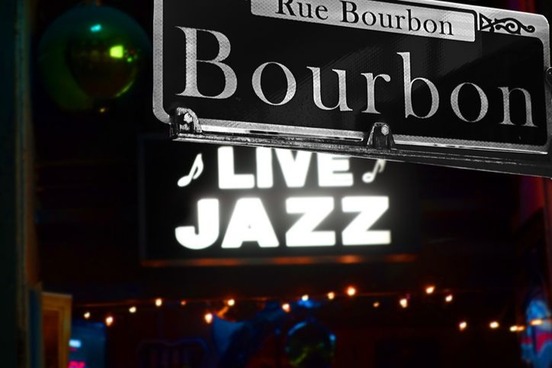
Jazz
Definition - American music developed especially from ragtime and blues and characterized by propulsive syncopated rhythms, polyphonic ensemble playing, varying degrees of improvisation, and often deliberate distortions of pitch and timbre.
There are many conflicting and confusing stories about the origins of the word jazz. Few, if any reference works on language are ready to make any definite pronouncements as to its etymology. The Oxford English Dictionary has written evidence for two distinct senses of the noun (meaning "energy" and "rubbish") before it was used to refer to a type of music.
However, the earliest written use for all three of these senses of the noun occurs within a three year span; this, coupled with the fact that jazz would have certainly been in spoken use for some time prior to this (there are other senses of the word, such as "to copulate with," which would have been considered vulgar, and unlikely to have been printed), means that we really don't know which sense of the word was the first to arrive in English.
And the chorus. They must have put the "J" to "Jazz," for they teemed with pepper and ginger.
— The Winnipeg Tribune (Winnipeg, Can.), 28 Jun. 1913

Gig
Definition - a job usually for a specified time; especially : an entertainer's engagement
The humble gig, the first half of today's gig economy, is a word of unknown origin. It is orthographically identical to many other gigs, including the ones meaning "something that whirls or is whirled," "a light 2-wheeled one-horse carriage," and "an arrangement of hooks to be drawn through a school of fish in order to hook their bodies," but etymologically unrelated. This gig begins appearing in writing in the mid-1920s, initially in reference to society or jazz bands working at a club or spot for some non-extended period.
It seems that this would be particularly advantageous for ‘gig’ bands appearing at places which are not usually used for the performance of copyrighted music and consequently not prepared with a license.
— Melody Maker, Apr. 1926

Schmaltz
Definition - sentimental or florid music or art
You may very well think of schmaltz as being the word you reach for when trying to describe your grandmother's sofa (which is fine; she doesn't care for your upholstery choices either). We have no opinion on either sofa.
Schmaltz comes from the Yiddish shmalts, which literally means "rendered fat." Oddly enough, when the word was taken into English it was in a context that had no culinary connection; the word was initially found applied to music that was seen as less than hip. Schmaltz is the noun form, and schmaltzy the adjective; both words date from the early 1930s.
Schmaltz has a tendency to make me slightly ill, and the average Broadway work of art is something from which I flee.
— Melody Maker, 1 Oct. 1934Next time you hear Rubinoff, or Harry Horlick or Emery Deutsch make their fiddles throb and sob in an overly-sentimental bit of music, what they're really doing—in the patois of Tin Pan Alley—is going "schmaltzy" on you!..."Schmaltz," a Yiddish word, is used by radio's musicians to indicate the art of "laying it on thick."
— The Daily News (New York, NY), 11 Sept. 1934

Far-out
Definition - marked by a considerable departure from the conventional or traditional
The earliest evidence we have for far-out comes in magazine articles from the early 1950s, on the subject of jazz.
A term of high approbation in the swing era was "out of this world," in the bop era it was "gone," and today it is "the greatest" or "the end." Similarly, a daring performance was "hot," then "cool," and now is "far out."
— Time, 8 Nov. 1954It says Dave is a serious piano player who likes people to be quiet while he is operating. There's also a box-index of "far-out words for cats."
— The Washington Post and Times Herald, 7 Nov. 1954
Far out has a similarity to out of this world, another idiom that has often been described as having originated in the language of jazz. While out of this world may indeed have been driven into the linguistic mainstream through association with jazz, it appears to have originated in African American vernacular prior to this, with the same meaning ("superb"), but applied to various and sundry aspects of entertainment, and not just jazz.
Bill Lancaster and Percy Warfield danced out of this world. They were spic and span, neat and classy in all of their numbers.
— Pittsburgh Courier (Pittsburgh, PA), 7 Jun. 1924Miller and Lyles in "Rang Tang," at the Royale, opened on July 12 to a packed house at $3 top and romped away to glory with a chorus out of this world.
— Chicago Defender, 23 Jul. 1927

Icky
Definition - offensive to the senses or sensibilities
Before icky referred to having contact with such things as a stranger's mucus it was part of the patois of the jazz world, both as an adjective and a noun (and having nothing to do with germs). An icky was a person whose taste in music was questionable (preferring, for instance, sweet jazz over hot). The adjective form of icky was synonymous with sentimental.
At Adrian Rollini’s, a small band featuring ‘Nick’ on clarinet, who once played with Louis Armstrong, is attracting the ikkies.
— Down Beat, Feb. 1936After an icky Rhapsody in Blueish introduction by Barney Bigard, Tricky Sam’s trombone announces the theme, in the saddest of possible tones.
— Melody News, 1 Oct. 1934

Square
Definition - a person who is conventional or conservative in taste or way of life
One of the notable aspects of the language associated with jazz is that it has a good number of synonyms for "strait-laced person." Square began being used in this manner, both as a noun and as an adjective (one can act square, or be a square) in the 1930s, around the same time that corny took on its meaning of "mawkishly old-fashioned."
And we know that our ballots attract many ooks, squares and assorted “barn dance sitters-in.”
— Down Beat, Feb. 1937A bilious tenor, and a very corny trombone do considerable damage, while Louis’s sky-riding coda could only please the ‘untin’ ‘ordes.
— Swing Music, Mar. 1935

Jam
Definition - to improvise on a musical instrument with a group
Jam has had many and varied meanings over the past three hundred or so years that it has been used as a verb in our language, and it seems likely that over the next several hundred years it will continue to attract additional new senses. Although this particular sense of jam has broadened somewhat over the past 80 years, taking on new parts of speech and encompassing musical genres ranging from male mid-life crisis basement music to I'd really like to not go to that concert, the origins of musical jamming come from describing jazz music in the 1930s.
Chuck Henry, sax; Pinky Brown, guitar; Don Gilkerson, trombone, and Connie Taylor, trumpet, took their instruments along, intending to jam a little in the wee hours of the dawn, but after the first fish was caught, somehow, not a single one of them gave a jam.
— Tempo, Aug. 1933





